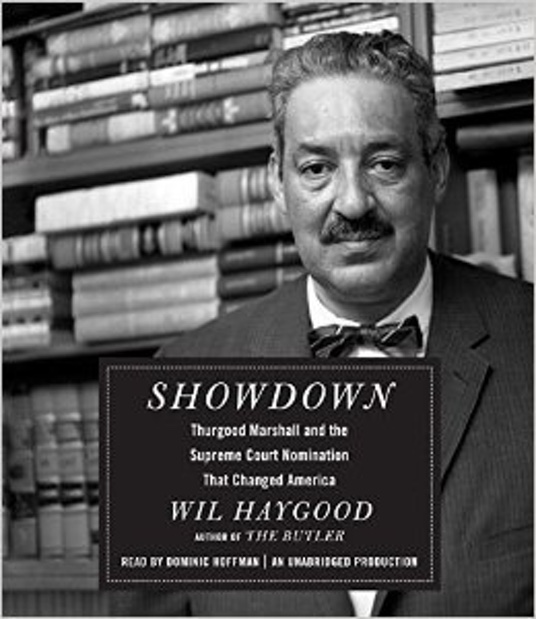
Showdown — Thurgood Marshall and the Supreme Court Nomination That Changed America by Wil Haygood
Biographer Wil Haygood has become as much of a national treasure (at least to the black community) for his exhaustive and penetrating books on persons of color as his latest subject — Thurgood Marshall — became for his legal acumen, tenacity and championing of racial underdogs.
If, as the old saying goes, that “History belongs to those who write it,” then Haygood, who over the years has chronicled the lives of blacks both famous and obscure, is not leaving the task of defining the black experience and struggles in America to someone from outside the race — he is making our stories ours.
As George Orwell once wrote, “The most effective way to destroy people is to deny and obliterate their own understanding of their history.”
Haywood’s book immediately prior to Showdown chronicled the life of Eugene Allen, a butler who had worked for eight presidents — Truman through Reagan — over 34 years. The Butler: A Witness to History was turned into the film, The Butler starring Forest Whittaker, a movie I panned for its unfairly negative portrayal of Lyndon Johnson on race issues. Although Haygood never spoke publicly in regards to how Hollywood perverted his words in converting them to the silver screen (the directors and producers felt the film needed a villain, someone opposed to the proposals for progress Martin Luther King, Jr. was agitating to implement), it was fairly well known that he was not pleased.
Nonetheless, he more than made up for the misrepresentation of Johnson in this latest book, and accurately portrays the former president as a Southerner who stood up and fought for what he believed in: fairness for all Americans. And the president thought it only fair and fitting in 1967 that a black should at last be appointed to serve on the Supreme Court, an idea that was heretical to the mossback Southern — and openly racist at the time — Dixiecrat senators that controlled the judiciary committee.
The stage was being set for an epic battle of wills, one that mirrored the civil rights struggles that were raging throughout the country, the very causes that Thurgood Marshall had spent his entire life and career waging. What worried Johnson the most was Marshall’s oftentimes acerbic tongue. Would he — could he — hold in check his powerful ability to mount withering legal rebuttals to the loaded questions the members of the committee would direct at him?
The judiciary committee, which could block Marshall’s nomination by not allowing it to get the floor of the Senate, was chaired by Mississippi senator James Eastland, a notorious bigot who would have help from other senators like Sam Ervin of North Carolina, John McClellan of Arkansas, and the worst of the lot, Strom Thurmond of South Carolina (who, Haygood points out, kept a black mistress and fathered a daughter by her).
But Marshall’s entire life — from his boyhood, being raised by financially struggling but strong parents in Baltimore (his mother once pawned her wedding ring to help pay his tuition to Lincoln University where he became a champion debater), to Howard University Law School where he quickly caught the eye of Dean Charles Houston (the most prominent black lawyer in America at the time), and on to his amazing career as the lead attorney for the NAACP Legal Defense Fund — had been preparing him for the five grueling days he spent answering the questions of bigoted men who detested him, and whom he detested right back with equal vigor, but nonetheless held his tongue.
President Johnson knew the Southern senators would go to any lengths to derail Marshall’s nomination, and he also knew that he would have to use all of his legendary backroom negotiating skills to win a battle that was turning into a virtual full-scale war.
When Senate aides couldn’t dig up any dirt on Marshall and the attempt at smearing by branding him a Communist didn’t work, the senators tried to link him to the street protests that were being led by Martin Luther King, Jr. But, while Marshall and King were cordial, the lawyer in him couldn’t abide the bending of the law in the manner in which the preacher was engaging. And Senator Ted Kennedy made pointed remarks about the scurrilous attempt at linkage that blew the Southerners more onerous remarks about the nominee out of the water.
Haygood’s genius as a writer lays in his ability to accurately capture the zeitgeist. The country was changing — the earth was shifting under the feet of the Southern senators as they begin to realize their racist way of life was being challenged in ways they couldn’t have imagined a few years prior, and they knew that if Marshall was confirmed to the Supreme Court those changes would accelerate.
But in the end Johnson prevailed by calling in favors and doing the kind of arm-twisting he was famous for; Marshall was confirmed and another nail was put into the coffin of the Dixiecrats. However, as Haygood ably points out, racists are akin to vampires; they rise up out of their coffins and morph — coming back to walk the earth once again — this time as Tea Partiers, currently being lead down a road to nowhere by the bigoted Donald Trump.

From Cool Cleveland correspondent Mansfield B. Frazier mansfieldfATgmail.com. Frazier’s From Behind The Wall: Commentary on Crime, Punishment, Race and the Underclass by a Prison Inmate is available again in hardback. Snag your copy and have it signed by the author by visiting http://NeighborhoodSolutionsInc.com.